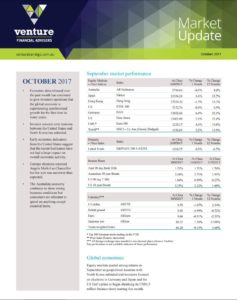The pulse

• Economic data released over the past month has continued to give investors optimism that the global economy is experiencing synchronised growth for the first time in many years.
• Investor concern over tensions between the United States and North Korea has subsided.
• Early economic indicators from the United States suggest that the recent hurricanes have not had a large impact on overall economic activity.
• German elections returned Angela Merkel as Chancellor but her win was narrower than expected.
• The Australian economy continues to show strong business conditions but consumers are reluctant to spend on anything except essential items.
Global economies
Equity markets posted strong returns in September as geopolitical tensions with North Korea subsided and investors focused on elections in Germany and Japan and the US Fed’s plans to begin shrinking its US$4.5 trillion balance sheet starting this month.
Australia
In Australia, the strong business conditions are continuing to create relatively robust jobs growth. Employment grew more strongly than expected in August and, pleasingly, there has been a rebound in the number of full time jobs which had lagged part time job growth.
US
Despite some distortions in the economic data caused by recent hurricanes, most of the data in the US has continued to show relatively strong economic activity. Unemployment has fallen to new cyclical lows of 4.2%, and the uptrend in wages growth appears to have resumed with the most recent reading showing annual wages growth at close to 3%.
Europe
In the Eurozone, business, consumer and economic sentiment surveys all suggest that the economy continues to perform well. Recent industrial production and factory order data from Germany has confirmed that business activity in Germany is still strong despite the headwinds to German exporters from the stronger Euro.
China
Chinese data over the past month has continued to be somewhat mixed. The official government PMIs, which tend to measure activity levels at the larger Chinese manufacturing and non-manufacturing firms, both rose to the highest levels in several years, while the privately commissioned surveys (which tend to measure small to mid-sized business activity) showed softer conditions.
Asia region
In Japan, the Bank of Japan’s quarterly Tankan survey showed that both big and small Japanese manufacturers are the most confident about business conditions in a decade, helped by a weaker Yen and strong global demand.